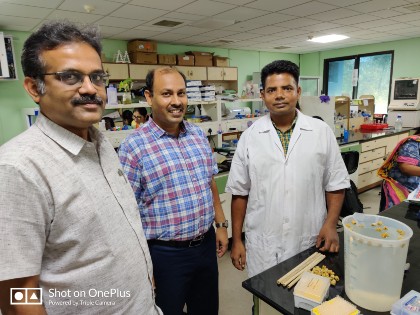IIT Madras Researchers show Copper-coated Jute Beads can prevent Microbial Contamination in Stored Water
Chennai: Indian Institute of Technology Madras Researchers have shown that simple copper-coated jute beads are highly effective in protecting water and preventing microbial contamination. The IIT Madras team seeks to solve the problem of water contamination and water-borne diseases in India.
The researchers have developed easy methods to coat cuprous oxide or copper on little beads of jute that float on water. They chose jute because of two reasons – jute floats on water and jute sticks are an agricultural waste product that is affordable and available at low costs.
In many parts of the country, water is often collected and stored in containers for consumption. Such stored water can be easily contaminated due to the transfer of microbes from the air into to the water, even if the container is kept closed. The traditional water purification method of boiling is economically and environmentally unsustainable.
Besides, the water continues to be vulnerable to microbial contamination after cooling. Water purification units such as filters and RO units may not be affordable to all and often, techniques like RO (reverse osmosis) produce a lot of unusable wastewater during the process of purification.
This research was led by Dr. Dillip Kumar Chand, Department of Chemistry, IIT Madras and his research student Mr. Randhir Rai. The paper has been co-authored by Dr. Dillip Kumar Chand, Mr. Rai and Prof. Sathyanarayana N. Gummadi, Department of Biotechnology, IIT Madras. The results were published in the reputed peer-reviewed journal ACS Omega.
Elaborating on this research, Prof. Dillip Kumar Chand, Department of Chemistry, IIT Madras, said, “The use of copper as a disinfecting material has been well known in India and people commonly store water in copper vessels for this purpose and there have been many studies worldwide to study the disinfection properties of copper and its salts. However, beyond a certain limit, copper can be toxic, and so, it is important that too much copper does not leach into the water.”
Mr. Randhir Rai, Research Student, Department of Chemistry, IIT Madras, said, “To prove the disinfectant properties of the copper coated jute beads, we took four beakers of clean water, added uncoated jute beads to one, jute beads coated with copper to the second, jute beads coated with copper oxide to the third and left the fourth beaker as it was, and studied the microbial content in all the beakers periodically.”
Prof. Sathyanarayana N. Gummadi, Department of Biotechnology, IIT Madras, helped the research team with the microbial assays.
When the beakers were kept uncovered for twenty-four hours, the one with the copper and copper oxide coated beads did not have any microbial growth while the one without the beads and the one with uncoated jute beads had significant microbial growth. After five days, the microbial contamination in the water with coated beads were far less than in the beaker without the coated beads.
The U.S. Environmental Protection Agency (EPA) recommends that the amount of copper in water be below 1.3 parts per million (ppm) for safety. The IIT Madras researchers showed that the copper that was coated on the jute beads did not leach to a large extent into the water, and even after five days, the amount of copper in the water was only around 0.8 ppm, far below the EPA mandate.
“Our study shows a simple and cost-effective way to keep water safe and empowers households and communities that lack potable water to protect themselves against a variety of waterborne pathogens,” added Mr. Randhir.
The team proposes to study the relationship between the properties of the coated beads and ‘microbicidal’ efficacy in future.

